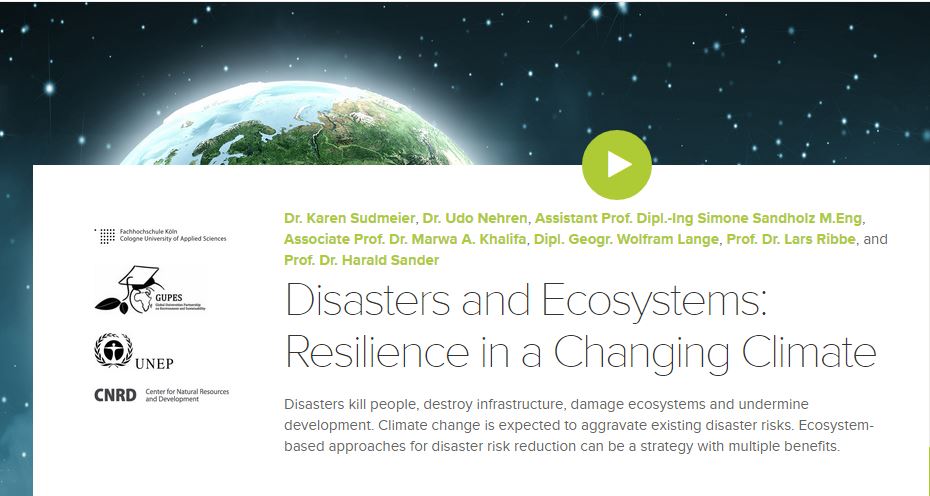Free online UNEP course "Disasters and Ecosystems: Resilience in a Changing Climate"
Discussion details
Enrol for free herePlease note that the course has already started, but you can still join in upcoming sessions.
What role do ecosystems play in reducing disaster risks and adapting to climate change? This is the topic of this exciting new massive open online course which has already started.
It was developed jointly by the United Nations Environment Programme (UNEP), the Center for Natural Resources and Development (CNRD) and the Cologne University of Applied Sciences (CUAS), Germany. This is UNEP's first MOOC, developed in the context of its engagement with universities worldwide including the Global Universities Partnership on Environment for Sustainability (GUPES). The course covers a broad range of topics from disaster management, climate change, ecosystem management and community resilience.
What will I learn?
After completion of the course, the participant will be able to:
-
Define basic concepts of disasters, disaster risk reduction, climate change adaptation and resilience.
-
Recognize key linkages between ecosystems, disaster risk reduction and climate change adaptation.
-
Recognize the linkages and overlaps between ecosystem based disaster risk reduction and ecosystem based adaptation.
-
Identify various ecosystem based tools in reducing disaster risk and climate change adaptation.
-
Identify key international agreements, organizations and initiatives related to disaster risk reduction, and climate change adaptation.
-
Apply concepts and tools of ecosystem-based disaster risk reduction (Eco-DRR) and ecosystem based adaptation (EbA).
-
Evaluate costs and benefits of different type of measures for reducing disaster risks.
-
Design your own ecosystem-based project for increasing resilience and reducing climate risks.
Course Structure
The course is structured in two parts:
The leadership track, which is tailored for busy professionals or students curious about the topic. The leadership track will run three weeks.
The expert track is for professionals and students who seek more in-depth learning and skill development in applying ecosystem-based tools for disaster risk reduction and adaptation. The expert track will run 12 weeks with 3 weeks for the final assignment, peer review process and course wrap-up. Each unit has several quizzes, a concise background document for further reading, a discussion forum, supplementary videos with interviews with international experts and short documentary videos from around the world. In addition, world leaders were interviewed for our MOOC.
Course Outline and Schedule
Chapter 1. Leadership track – introduction (Week 1) Unit 1. Disasters and Ecosystems: Resilience in a Changing Climate - why take this course? Unit 2. Introduction to disasters, risk reduction and climate change
Chapter 2. Leadership track – linking disasters, climate change and ecosystems, Part 1 (Week 2) Unit 3. Links between disasters, disaster risk reduction, adaptation and key international actors Unit 4. Principles and challenges of ecosystem-based disaster risk reduction (Eco-DRR) and adaptation (EbA)
Chapter 3. Leadership track – disaster management, resilience and ecosystems (Week 3) Unit 5. Ecosystem management contributions pre- and post-disasters Unit 6. Managing resilience and transformation
Chapter 4. Expert track – linking disasters, climate change and ecosystems, Part 2 (Weeks 4&5) Unit 7. Linking ecosystems and humans to disasters Unit 8. Principles of systems thinking and using natural systems for disaster risk reduction Unit 9. Putting Ecosystem-based disaster risk reduction (Eco-DRR) into practice
Chapter 5. Putting theory into practice (Weeks 5 & 6) Unit 10. Linkages between Eco-DRR and EbA Unit 11. Putting Ecosystem-based adaptation into practice & peer review assignment
Chapter 6. Ecosystem-based tools for disaster risk reduction – introduction (Week 7) Unit 12. Incorporating ecosystems in risk assessments Unit 13. Ecosystems and spatial tools for risk reduction
Chapter 7. Most common Eco-DRR tools (Week 8) Unit 14. Principles of spatial planning and community-based tools for Eco-DRR
Chapter 8. Most common Eco-DRR tools (Week 9) Unit 15. Sustainable land and water management tools for Eco-DRR Unit 16. Ecological engineering for disaster risk reduction and climate change adaptation
Chapter 9. Economics, valuation and policy issues (Week 10) Unit 17. Economic tools for Eco-DRR Unit 18. Principles of mainstreaming ecosystem based disaster risk reduction into national policies, strategies, plans and projects
Chapter 10. Resilience and transformation & final assignment (Weeks 11 -13) Unit 19. Approaches for operationalizing resilience Unit 20. Problem solving assignment – peer review of assignments
Chapter 11. Course wrap-up (Week 13) Unit 21. Course wrap-up and forum discussions
Who is teaching this course?
Instructors include international faculty members from Germany, Egypt, Austria and Switzerland, supported by a line-up of expert guest lecturers and exclusive interviews with world leaders in the field of climate change, disaster risk reduction and environment:
• Dr. Achim Steiner (Executive Director of UNEP) • Ms. Margareta Wahlström (Special Representative of the Secretary-General of the United Nations for Disaster Risk Reduction) • Dr. Rajendra Pachauri (Chancellor of TERI University) • Ms. Julia Marton-Lefèvre (Director General of the International Union for the Conservation of Nature 2007-2015
Will there be exams involved?
In total, we estimate that a total of 40-50 hours is needed to complete the course (taking both the Leadership and Expert Tracks).The Leadership track has quizzes so you can self-check your knowledge level as you go. This is, however, not a precondition for progressing to the next module. And you may, however, choose to revisit a module if you feel you did do not perform satisfactorily in a module. The Expert track has two short peer-reviewed assignments and one final peer-reviewed exercise where you will be designing your own project! The peer reviewed exercises will provide an environment for interaction between course participants. You are welcome to use any other communication tool to facilitate group assignments.

(1)
Log in with your EU Login account to post or comment on the platform.
very nice course